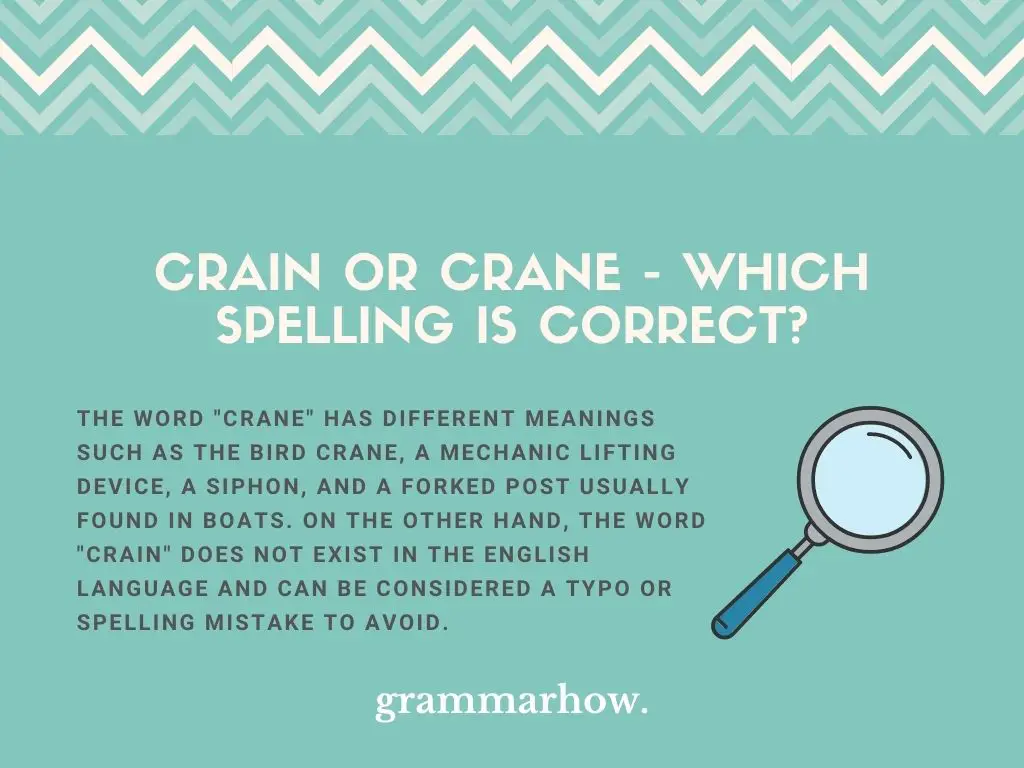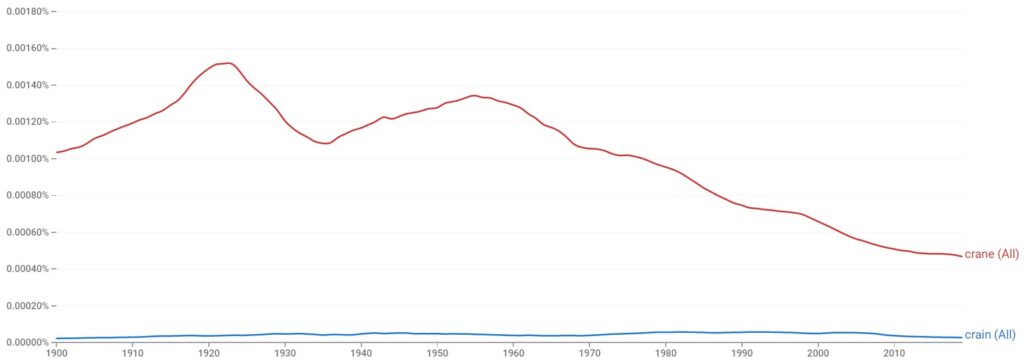Sometimes, we come across different spellings for words we know that makes us doubt which the correct spelling is. One of those cases is the word “crane” spelled as “crain”. But which of the spellings is correct and which should we use? Read on, all answers and examples are ahead.
Crain or Crane – Which Spelling Is Correct?
The word “crane” has different meanings such as the bird crane, a mechanic lifting device, a siphon, and a forked post usually found in boats. On the other hand, the word “crain” does not exist in the English language and can be considered a typo or spelling mistake to avoid.

Among the many meanings of the word crane, we can find the bird crane, a large bird with a long neck and legs from the Gruidae family, a nautical term, the metallic arm that holds kettles next to a fireplace, or a mechanical lifting device.
When used in any of the meanings above, the word “crane” is a perfect use of the English language. On the other hand, the word “crain” is neither a word nor a synonym for it. Moreover, they are not interchangeable terms because “crain” is a typo or spelling mistake that should be avoided.
Crain
“Crain” can be a spelling mistake or typo that is similar to other English words such as “crane” or “brain”. Since it is not an English word, it shouldn’t be used. Therefore, if you encounter this word, it might be a spelling mistake and context will dictate what the intended word was.
When asked “is crain a word?” the answer should be no. It might be a typo or a spelling mistake since there are a plethora of similar words like “brain” or “crane”. Therefore, context will tell you what word the writer tried to use instead of that mistake.
Furthermore, the Cambridge Dictionary confirms that the word doesn’t appear in its vast records.
Let’s see some wrong examples you shouldn’t follow in which “crain” is used instead of “crane”.
- Did you see the bird crain flying by? They are huge!
- Did you hear? They’re using 23 crains to build the new offices for the company; they’ll be massive.
- The crain that was holding the kettle in place next to the fire broke and the water extinguished the fire.
- Somebody said the crain was not working properly and thus the construction stopped.
- Have you seen any crains flying over the lake? They have long legs and necks.
Crane
The word “crane” is word in the English Language with a plethora of meanings. Indeed, it refers to the bird crane, a mechanic machine for lifting heavy weights, a metal arm to keep the kettle over the fire, a siphon, and a forked post on a boat.
When consulting the Cambridge Dictionary about the word “crane”, this dictionary adds to the definitions above its use as a verb. As such, it means stretching one’s neck to be able to look at something that is out of one’s natural reach.
Let’s see how to use “crane” in a sentence:
- Did you use the crane to put the roof on those houses? That looks heavy!
- All you could see from a distance is the tall cranes putting together the skyscrapers.
- She said I was trying to crane over my box to witness the situation, but I wasn’t.
- The crane broke down in the middle of the day so we had to go home and be there the next day extra early.
- Did you see those cranes flying by? I couldn’t take my camera out on time to photograph them.
- The cranes on the boat were a little loose; they could have caused a catastrophe!
Which Is Used the Most?
Although according to the Google Ngram Viewer the word “crane” enjoyed a high popularity level at the beginning of the past century with its all-time peak in 1922, it has been going through a negative popularity trend ever since. On the other hand, “crain” has always remained close to zero for being a spelling mistake or typo.

Final Thoughts
While “crane” can be used to talk about the bird crane, a mechanical machine to lift heavy objects, a metal arm to hang a kettle over the fire, a siphon, or the forked post on a boat, “crain” is not an English word. Therefore “crain” should be avoided.
